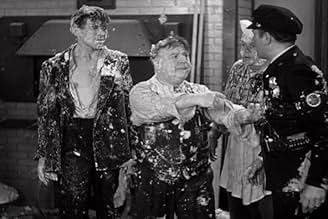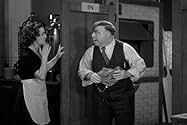Aggiungi una trama nella tua linguaSlim starts his first day of work at a bakery on the same day that local gangsters pay a visit to his boss demanding protection money. When the boss refuses to pay, the gangsters hatch a pla... Leggi tuttoSlim starts his first day of work at a bakery on the same day that local gangsters pay a visit to his boss demanding protection money. When the boss refuses to pay, the gangsters hatch a plan to destr0y the bakery, but the plan doesn't quite work out the way they thought it would... Leggi tuttoSlim starts his first day of work at a bakery on the same day that local gangsters pay a visit to his boss demanding protection money. When the boss refuses to pay, the gangsters hatch a plan to destr0y the bakery, but the plan doesn't quite work out the way they thought it would.
- Regia
- Sceneggiatura
- Star
- Mr. Shultz
- (non citato nei titoli originali)
- Mr. Smith
- (non citato nei titoli originali)
- Bugs
- (non citato nei titoli originali)
- Bakery Clerk
- (non citato nei titoli originali)
- Cop
- (non citato nei titoli originali)
- Toots
- (non citato nei titoli originali)
- Maisie
- (non citato nei titoli originali)
Recensioni in evidenza
NO WHERE IS this more applicable than in the case of famed Comedian of the Silent Film days than Roscoe "Fatty" Arbuckle. The huge funny-man had his career ruined (and probably his life expectancy abruptly curtailed) following some flimsy accusation of rape from a film "starlet"; who later died of a ruptured bladder. Virginia Rappe had been known to have frequently made such claims before against several others.
AFTER UNDERGOING THREE trials (the first two had ended with hung juries) Arbuckle had these charges dismissed against him with an apology from the Judge & Jury. The whole legal episode was supposedly the responsibility of newspaper magnate William Randolph Hearst and some other Yellow Journalists; who hated Arbuckle and the Hollywood establishment in general.
TODAY'S REVIEWED FILM, this two reeler sound short, IN THE DOUGH (Vitaphone/Warner Brothers, 1933) was the penultimate installment in what was an outstanding comeback effort. The great film comic tragically passed away before its release in 1933.
AS FOR THE movie itself, it was overall a sample of a sort of standard fare of the day. Its threadbare premise is more than sufficient as a framework and backdrop for the story. In short; a baker is being victimized by a gang of extortionists; who are headed up by Lionel Stander and Shemp Howard. Arbuckle answers the "help wanted-baker" window sign and gets entangled in the crossfire. An ongoing additional gag is thrown in with a prim, proper and prissy man who insists on certain specifics ion a made to order cake.
WITH THE APPEARANCE of a young, but tough female, who turns out to be the gun moll of the gang, the story hits its zenith of ultimate action, plot twists and merriment.
IT IS FORTUNATE on our part to be able to screen such film rarities on our home computers; this one being courtesy of our friends at Youtube.com.
JUST WHAT HEIGHTS that Mr. Roscoe Arbuckle could have achieved in this early sound era comeback will never be known. He remains a most tragic figure in the checkered history of Tinsel Town; having "cashed in his chips" at the age of 46!
The problem with this film is that it relies on slapstick. Even during the slapstick era, Arbuckle rarely resorted to cheap laughs. But the entire final portion of the film is a variation on the old pie fight--with Fatty and some jerks throwing dough and cakes at each other. Funny? Not really. And not nearly as charming and sweet as his earlier pictures. Not entirely bad but far from his best work.
Roscoe applies for a job in a bakery. When asked why he wants to be a baker, Roscoe grins broadly and replies: "Because I knead the dough."
Just when Roscoe is mixing a big vat of dough, along comes a hoodlum running a protection racket, played by the gifted comic actor Lionel Stander. One thing leads to six others, and soon Roscoe and Lionel have begun a bitter battle in the boiling biscuit batter. I usually don't see anything funny about actors getting splattered with sticky goo, but "In the Dough" is an exception.
There's a nice running gag about a Karl LaFong-ish customer who orders a birthday cake with very specific decorations: he wants "a large 'S' ... a capital 'S'." But this gag has been re-used by other comedians, so you probably know the punchline.
When I saw "In the Dough" at the American Museum of the Moving Image, with an audience full of New Yorkers, most of the audience members laughed at a stock shot of a police car stopping near a billboard for the Greenpoint Savings Bank. Apparently this is funny to New Yorkers.
The same stock shot turned up in another of Arbuckle's Vitaphone movies, and the audience laughed even harder the second time it showed up.
"In the Dough" was directed by Ray McCarey, brother of comedy legend Leo McCarey. While definitely not as talented as his brother, Ray McCarey made some excellent films and he deserves to be remembered as an efficient comedy director in his own right.
** 1/2 (out of 4)
A bakery store owner has a group of gangster show up wanting money for "protection" but he refuses. That same day a man named Slim (Roscoe 'Fatty' Arbuckle) shows up wanting the job of the baker. Soon the new baker goes up against the gangsters. IN THE DOUGH was the next-to-last film for Arbuckle who gets several good moments here even if the film itself isn't really that good. It's clear that this was meant as a throwback to his Keystone days because a lot of the humor comes from dough throwing. If you've seen at least one Keystone short then you've probably seen some sort of food fight and that tradition pretty much carries on here as we get at least two different and long sequences dealing with dough being thrown around. These scenes are certainly funny in their own right but the film really doesn't offer too much else. The entire subplot of gangsters threatening someone for money had been done countless times even by 1933 and there's really nothing new done with it. There's an ongoing gag dealing with a man who keeps wanting a larger cake but the final pay-off really isn't that funny. Arbuckle is certainly the main reason to watch this as he appears to be having a good time and there's no question that he's charming enough in the part. One of the gangsters is played by Shemp Howard so fans of his will also want to check this out.
Lo sapevi?
- QuizThis film was the last ever made by Roscoe Arbuckle, though not the last of his pictures to be released in theatres. He had acted in this and other short films for Vitaphone in hopes of reviving his movie career, which was derailed by scandal in the early 1920s. His final day of work on the picture, shot in Brooklyn, New York, was June 28, 1933. That evening, he went to a party with his wife at a popular Manhattan restaurant to celebrate his anniversary. In the early hours of the following morning, Arbuckle died in his sleep of a heart attack. He was 46. This film was released posthumously in November of that year.
- ConnessioniEdited into Happy Times and Jolly Moments (1943)
I più visti
Dettagli
- Data di uscita
- Paese di origine
- Lingua
- Celebre anche come
- Big V Comedies (1933-1934) #5: In the Dough
- Luoghi delle riprese
- Azienda produttrice
- Vedi altri crediti dell’azienda su IMDbPro
- Tempo di esecuzione
- 22min
- Colore
- Mix di suoni
- Proporzioni
- 1.37 : 1





















